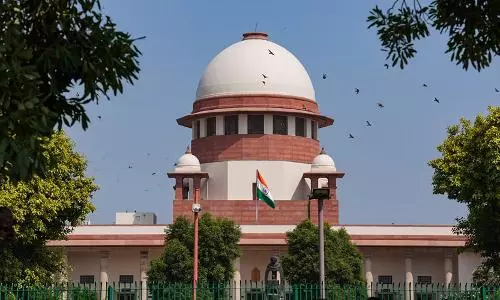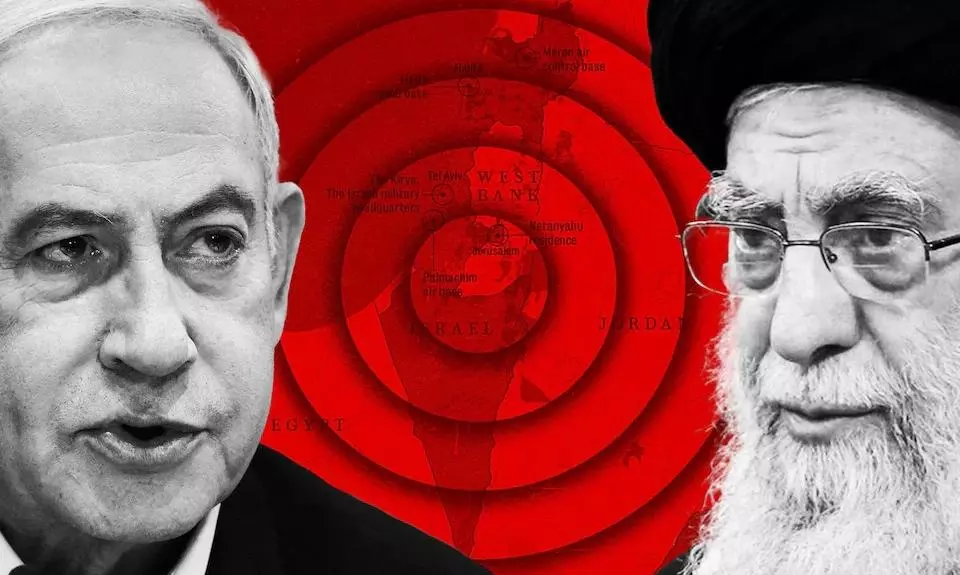
Middle East simmers as new warfront opens: What comes next?
text_fieldsThe newly opened war front in the Middle East, with Iran volleying hundreds of missiles towards Israel in response to an Israeli attack on Iran’s diplomatic missions in Syria, resulting in the deaths of eight individuals, including one of its commanders, however, still remains clandestine regarding what is next in the offing
While the US backed Israel's right to defence in the prevailing situation, it distanced itself from participating in Israeli retaliation against Iran, with US officials declaring that the US does not involve itself in any military action against Iran, and US President Joe Biden telling Israel to consider the interception of over 300 Iranian missiles as a credit for now.
The attack, which involved drones and missiles targeting Israel after an Israeli strike on an Iranian diplomatic facility in Syria, has drawn mixed reactions from global leaders and heightened tensions in the Middle East.
Meanwhile, at the UN Security Council, a flurry of reactions from the US, Israel, and Iran emerged, with Israel equating Iran’s supreme leader Ayatollah Khomeini to Hitler, seeking extra sanctions on Iran for the latest attack, and the US asserting that Iran did not notify them of the attack beforehand, prompting Iran to respond and clarify the mode of its attack.
Russia's Vasily Nebenzia criticized the council for what he deemed hypocrisy and a double standard, highlighting its failure to convene in a similar manner following Israel’s attack on the Iranian consulate in Damascus.
He also pointed out what he described as the "now regular attacks by Israel against Syria and Lebanon." Nebenzia warned that if the council continues to remain inactive on such matters, "your appeals to restraint by all parties can become futile."
US officials have been navigating a delicate balancing act in their response to the situation. While reaffirming their unwavering support for Israel's security, they have also sought to avoid escalating the conflict further. President Joe Biden has emphasized America's commitment to Israel's defence but has made it clear that the US does not seek a war with Iran.
Despite expressing solidarity with Israel, Biden and other national security officials reportedly conveyed to Israeli Prime Minister Benjamin Netanyahu that they would not join further military action against Iran.
The nuanced approach from the US reflects the complex relationship between Biden and Netanyahu, particularly amid escalating tensions in the region. Biden's handling of the situation has faced scrutiny, with some accusing him of caving to political pressure and appeasing peace activists. However, Biden has maintained that Israel's successful defence against the Iranian attack should be seen as a victory.
Leaders of the G7 countries have convened to discuss a diplomatic response to Iran's actions, underscoring the international concern over the situation. The attack has reignited fears about Iran's nuclear ambitions, with Israeli officials warning that Iran is rapidly advancing toward nuclear capabilities.
Israel's permanent representative to the UN, Gilad Erdan, has urged the Security Council to condemn Iran and impose sanctions before it's too late. However, Russia has accused the council of hypocrisy for failing to address Israeli attacks on Iranian targets in the past.
Despite efforts to avoid escalation, the situation remains precarious. Iran has defended its actions, claiming that it targeted only military objectives and took precautions to minimize civilian harm. Iranian officials have also asserted that they provided advance notice to neighbouring countries and the United States, although US officials have disputed this assertion.
Iraq, Turkey, and Jordan have confirmed that Iran provided advance warning of the attack, allowing them to take precautions. However, concerns persist about the potential for further violence and casualties. Biden has assured Israel that the US will not join any retaliation, but Israeli officials have vowed to hold Iran accountable on their own terms.
As tensions continue to simmer, the international community faces the challenge of preventing further escalation and finding a diplomatic solution to the crisis. The coming days will likely be critical in determining the trajectory of the conflict and the prospects for peace in the region.
Overall, the situation underscores the complexity of the geopolitical landscape in the Middle East and the challenges of managing conflicts between regional powers. The involvement of multiple actors, including the US, Israel, Iran, and other regional players, adds layers of complexity to the situation and underscores the need for diplomacy and strategic manoeuvring to avoid a further deterioration of the situation.
The recent escalation between Iran and Israel has raised significant concerns about the potential for further violence and instability in the region. The response from the US and other international actors will be crucial in determining the trajectory of the conflict and the prospects for peace. As diplomatic efforts continue, the focus remains on finding a peaceful resolution to the crisis and preventing further escalation.























